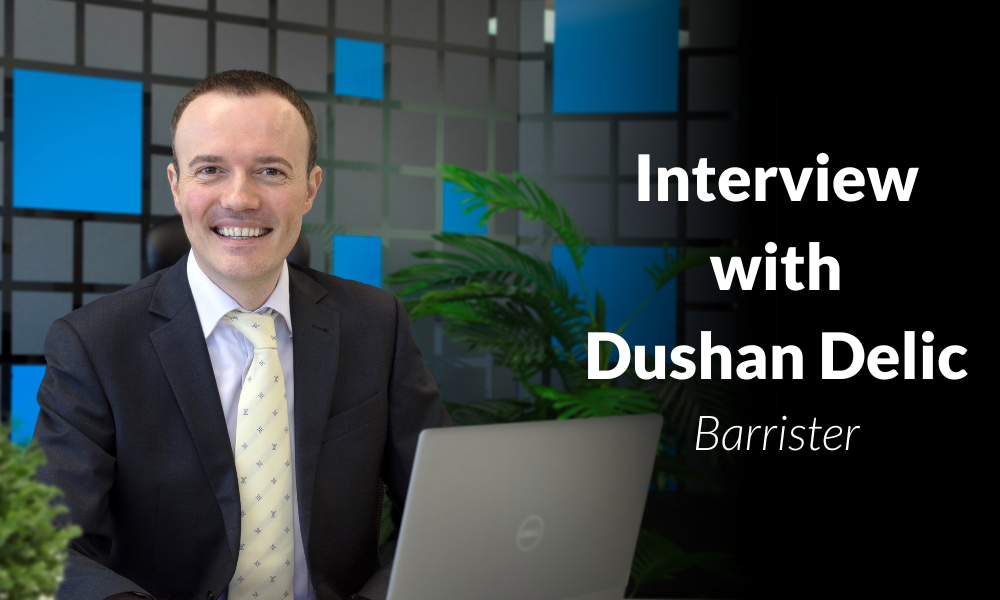
Dushan Delic reveals his journey from solicitor to barrister and his adoption of AI in law

After fifteen years as a litigator and over a decade as a director and partner at boutique law firm SD Legal, Dushan Delic has bid farewell to his role as a solicitor. Driven by a desire for independence, autonomy, and a deeper focus on his areas of expertise, Delic has struck out on his own to become a barrister—a move he describes as providing a “unique sense of accomplishment and satisfaction.”
However, a solo journey is not always an easy one, and Delic says there have already been plenty of challenges to navigate.
“At the start, the biggest challenge was being mindful of the new intervention rule for barristers around taking direct instructions versus taking instructions from a solicitor,” Delic tells NZ Lawyer. “But also, being independent means exactly that – you’re on your own, and you need to be completely on top of things.”
As a solicitor used to working as part of a larger team, Delic was used to an all hands on deck approach – something most barristers don’t have the luxury of. However, the work satisfaction is second to none, and Delic notes that a recent Court of Appeal case has highlighted exactly what attracted him to being a barrister in the first place.
“It’s a perfect blend of performance and intellectual challenge, which I find very fulfilling,” he explains. “You get involved in a broad spectrum of cases as a barrister, and each one is unique and challenging in its own way.”
With his transition to becoming a barrister, Delic also recognises the potential for artificial intelligence to provide a supporting role in the legal sector, and describes AI as the ‘ultimate next step.’
He notes that there is still some hesitancy when it comes to adoption, and many legal professionals have valid concerns – ‘hallucinated cases,’ for example, as well as copyright and confidentiality issues. But on the flip side, the wealth of opportunity offered by these tools can be unparallelled, and the key to using them successfully is to ensure you have the most tailored and specialised tools available.
He says the role of extractive AI in legal research is particularly exciting, as it has the potential to cut down on hours of intensive labour. This includes tools like the upcoming Lexis+, which promises to make legal research more intuitive and efficient – particularly for complex queries.
“I do a lot of research, and an area that litigators aren’t very fond of are the protocols, discovery, indexing, etc. It’s very time consuming but not very intellectually challenging,” Delic says.
“Specially-trained AI could speed up those tedious tasks, so that’s an area where I’d definitely want to use these tools.”
Lexis+ promises to be a cutting-edge tool tailored for the legal industry in New Zealand, and uses powerful extractive AI to search within its vast existing library of resources. The content is entirely ringfenced, guaranteeing complete confidentiality and no hallucinated cases.
“At the end of the day as litigators, the buck stops with us,” Delic says.
“We need to ensure that what we’re sending to clients is accurate and fit for purpose. Lexis+ as a tool would be far superior to anything else available, because the content would be so targeted and accurate. I’d absolutely jump on board whenever it is available.”
Despite AI’s various ‘teething issues’ in the legal industry, Delic says he’s very optimistic about the integration of AI into legal practice. While many of the existing tools aren’t yet perfect, Delic plans to stay at the forefront of these advancements and embrace the opportunities they offer – all while keeping a close eye on the frontrunners in this space.
To other lawyers thinking of making a major change, whether it’s adopting new technology or making a major career move, Delic’s message is simple – if you feel prepared, take the leap.
“Being a barrister has allowed me to focus on a broader spectrum of cases, it offers significant benefits for work-life balance, and you’ll have the opportunity to build a personal brand in the legal market,” Delic says.
“You also have the unique opportunity to work on cases that shape the jurisprudence of New Zealand, so there’s a sense of contributing to something bigger than yourself.
“My advice is if you're prepared to step into a world where no two cases are the same, where your efforts are directly linked to your accomplishments and where your ability to make a difference is unparalleled, then I'd say take the leap and embrace the challenge.”
Dushan Delic specialises in civil and commercial litigation, relationship property and employment law, having a very successful track record. To contact Dushan for more information about his legal services, kindly email at [email protected] or call 021 840 840.